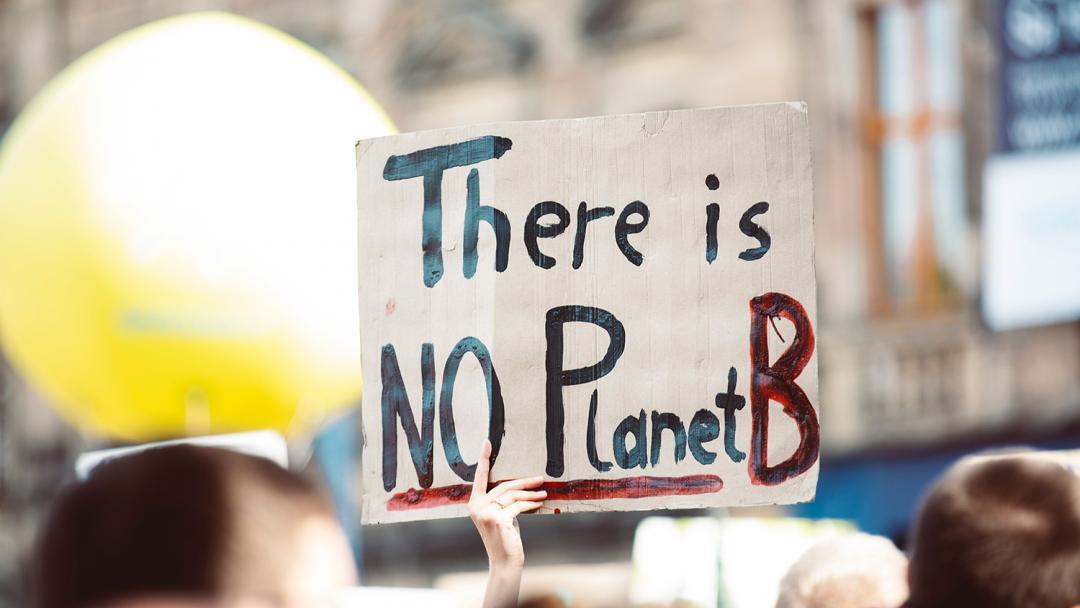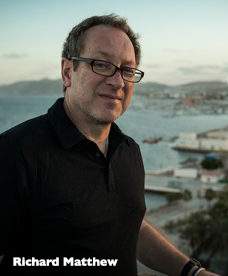
Richard Matthew shares his global expertise on The State of the World podcast
To deal with climate change, global institutions and countries must work together to address migration, the inequitable distribution of wealth, and distrust in political systems caused by disinformation and misinformation, says Richard Matthew, a UC Irvine professor of urban planning & public policy and political science.
Matthew, who also is the University of California Institute on Global Conflict and Cooperation’s research director for climate change and international security, director of the UCI Blum Center for Poverty Alleviation and director of strategic engagement with the UCI School of Social Ecology, spoke on episode three of “The State of the World,” a special series of IGCC’s Talking Policy podcast. He was joined by host Lindsay Morgan and  Fonna Forman, professor of political science and founding co-director of the Center on Global Justice at UC San Diego and co-chair of the UC Global Climate Leadership Council.
Fonna Forman, professor of political science and founding co-director of the Center on Global Justice at UC San Diego and co-chair of the UC Global Climate Leadership Council.
Climate change was the topic of discussion on The State of the World episode that was recorded on Dec. 11, when Matthew and Forman explained the science of where we are and how we got here—and offered ideas about the role individuals have to play in finding solutions.
Strategies to collectively deal with climate change have barely been enacted since the issue first landed on the global agenda in the 1990s, Matthew noted.
“Governments don’t tend to be boldly innovative,” he said. “They don’t tend to go out there and sort of lay the terms for dramatic change. They’re more likely to respond to changes that are percolating up through society broadly. So, what’s really important is that everybody gets involved and starts to do what they can do, as climate action. If we sit back and we hope that they’re going to solve this problem at the next COP meeting, we’re going to be frustrated.”
As with the civil rights and women’s movements, people will be the driving voice for addressing climate change, not governments and businesses, Matthew said, although he does see a role for government in “big issues” like migration.
“We can’t allow all migrants who are leaving drought or flood or violence or something like this to move into the neighboring country or to make it to one place in – in Europe. And think that that country is going to deal with the whole problem,” he said.
“We need to develop these solutions to migration where everybody picks up some of the burden and come up with migration policy that’s fair and start to reconcile it with the migration policies of other countries, so that we can recognize that this is a normal adaptive response, and it can be in all of our interests.”
Ours is a very wealthy world, but that wealth is “concentrated in a small number of hands,” Matthew noted. “So, one of the things that political leaders and business leaders need to be committed to doing is finding ways to make the enormous resources and capability of the planet accessible to those who, right now, have very little access to it.”
Rebuilding public trust will be required before any major action on climate change can be accomplished, he said. “Because you can’t really have a system, a political system, and policies and laws coming out of that system that are bold and innovative, when you have most of the people feeling marginalized and wary of that system.”
Despite the major challenges ahead, Matthew remains hopeful.
“When you look at the climate change movement around the world, you look at it today in 2024. It is full of young social entrepreneurs, of artists, of filmmakers, of teachers, doctors, scientists. It’s full of this big diverse group of people who are really creative, really passionate, and who are doing things. And this is very promising. Thirty-five years ago, nobody in the world was talking about climate change. Today, everybody in the world is talking about climate change. I think this is remarkable. This is promising. It creates opportunities for everybody. And so, you know, from the household to municipal politics to the UN system, there are reasons to be buoyed up by what we’re seeing.”
Click here to listen to the episode or read the transcript.
— Matt Coker